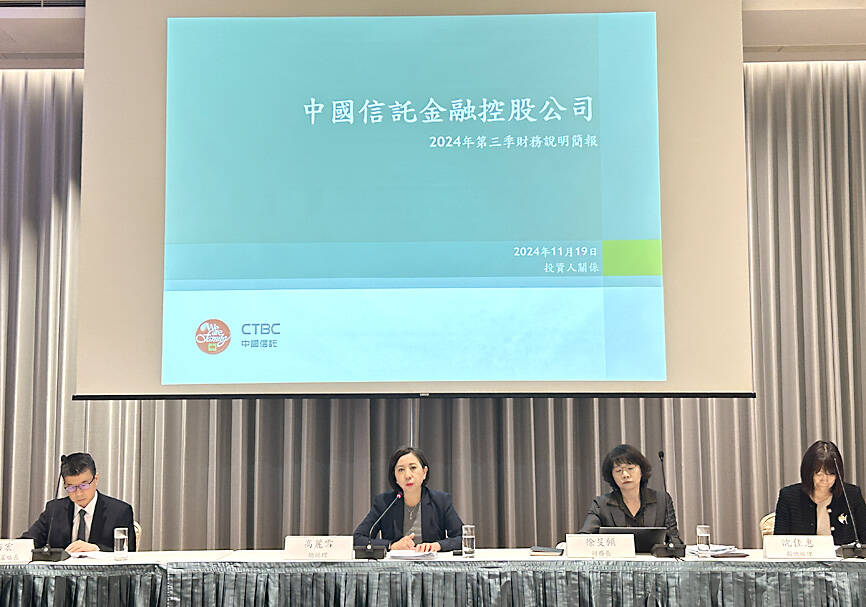The macro-environment looks positive and stable for CTBC Financial Holding Co’s (中信金控) operations this quarter and beyond, with foreign exchange volatility rising, CTBC Financial president and spokeswoman Rachael Kao (高麗雪) told a news conference in Taipei yesterday.
The conglomerate earlier reported record net income of NT$58.65 billion (US$1.81 billion) for the first three quarters of the year, up 20.7 percent year-on-year, with earnings per share (EPS) of NT$2.95, up 21.2 percent from a year earlier.
The results beat market expectations, thanks to strong earnings from the financial holding company's banking and insurance units.

Photo: CNA
The chances are good that CTBC Financial would issue NT$2 per share in cash dividends next year, Kao said, adding that the board must first discuss the matter after considering its capital adequacy and other needs.
Economic fundamentals look positive this quarter at home and abroad, giving the US Federal Reserve no urgency to loosen its monetary policy, although global markets are bracing for an inflation bump following Donald Trump’s win in the US presidential election this month, Kao said.
On the campaign trail, Trump pledged to cut corporate income taxes and stiffen tariffs on imports as part of his effort to tackle trade imbalances.
The US dollar appreciated and might hold strong going forward, Kao said.
Main subsidiary CTBC Bank (中信銀行), which drove 61.86 percent of the overall profitability, started adjusting its bond portfolio quite early and would benefit from interest rate changes if its expectations materialize, she said.
The bank reported healthy increases in loan and deposit bases, sales of wealth management products, as well as credit card and institutional banking business, she said.
Financially, the bank focuses on investment-grade debts and would boost its stock holdings in line with its deposit levels, Kao said, adding that it would realize gains on its holdings and adjust bond positions as it sees fit.
CTBC Bank reported NT$36.28 billion in net profit during the first nine months, up 14 percent year-on-year, driven by strong fee income growth and foreign exchange swap gains.
The bank outperforms local peers in terms of profitability even though lenders are not capital gains oriented, Kao said.
CTBC Bank would seek expansion in Southeast Asia, including in Cambodia and Malaysia, to serve Taiwanese firms, whose presence in the region is growing rapidly, she said.
Among its branches, the one in Hong Kong generated the most profit at NT$5.8 billion, followed by Singapore (NT$2.1 billion) and China (NT$1.3 billion), she added.
The group’s insurance unit, Taiwan Life Insurance Co (台灣人壽), reported NT$36.1 billion of first-year premiums in the first nine months of the year, a 10 percent increase from the same period last year, Kao said.
The unit's net profit gained 46 percent year-on-year to NT$21.07 billion on the back of strong capital gains, stemming from advances in stock, bond and fund values, Kao said.
Taiwan Life’s business strategy emphasizes product diversification and stability, and it promotes protection and value-based insurance policies, she said.

CAUTIOUS RECOVERY: While the manufacturing sector returned to growth amid the US-China trade truce, firms remain wary as uncertainty clouds the outlook, the CIER said The local manufacturing sector returned to expansion last month, as the official purchasing managers’ index (PMI) rose 2.1 points to 51.0, driven by a temporary easing in US-China trade tensions, the Chung-Hua Institution for Economic Research (CIER, 中華經濟研究院) said yesterday. The PMI gauges the health of the manufacturing industry, with readings above 50 indicating expansion and those below 50 signaling contraction. “Firms are not as pessimistic as they were in April, but they remain far from optimistic,” CIER president Lien Hsien-ming (連賢明) said at a news conference. The full impact of US tariff decisions is unlikely to become clear until later this month

With an approval rating of just two percent, Peruvian President Dina Boluarte might be the world’s most unpopular leader, according to pollsters. Protests greeted her rise to power 29 months ago, and have marked her entire term — joined by assorted scandals, investigations, controversies and a surge in gang violence. The 63-year-old is the target of a dozen probes, including for her alleged failure to declare gifts of luxury jewels and watches, a scandal inevitably dubbed “Rolexgate.” She is also under the microscope for a two-week undeclared absence for nose surgery — which she insists was medical, not cosmetic — and is

GROWING CONCERN: Some senior Trump administration officials opposed the UAE expansion over fears that another TSMC project could jeopardize its US investment Taiwan Semiconductor Manufacturing Co (TSMC, 台積電) is evaluating building an advanced production facility in the United Arab Emirates (UAE) and has discussed the possibility with officials in US President Donald Trump’s administration, people familiar with the matter said, in a potentially major bet on the Middle East that would only come to fruition with Washington’s approval. The company has had multiple meetings in the past few months with US Special Envoy to the Middle East Steve Witkoff and officials from MGX, an influential investment vehicle overseen by the UAE president’s brother, the people said. The conversations are a continuation of talks that

Alchip Technologies Ltd (世芯), an application-specific integrated circuit (ASIC) designer specializing in artificial-intelligence (AI) chips, yesterday said that small-volume production of 3-nanometer (nm) chips for a key customer is on track to start by the end of this year, dismissing speculation about delays in producing advanced chips. As Alchip is transitioning from 7-nanometer and 5-nanometer process technology to 3 nanometers, investors and shareholders have been closely monitoring whether the company is navigating through such transition smoothly. “We are proceeding well in [building] this generation [of chips]. It appears to me that no revision will be required. We have achieved success in designing